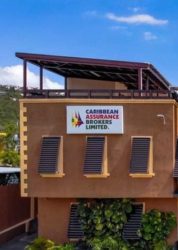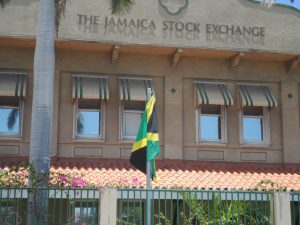
Jamaica Stock Exchange indices rose again on Monday.
The main market stocks of the Jamaica Stock Exchange enjoyed a day of more rising prices than those declining which helped to lift the market indices higher than at the close on Friday. Trading was light with just $20 million trading taking place.
The All Jamaica Composite Index gained 624.71 points to 256,656.25, the JSE Market Index gained 569.18 points to 233,842.93 and the JSE US dollar market index advanced 12.74 points to 201.17.
At the close of trading, 20 securities changed hands in the main market with 2 trading in the US dollar market, leading to 12 stocks advancing and 5 declining. The main market ended with 1,923,682 units valued at only $19,764,112 changing hands compared to 1,934,322 units valued at $34,659,775 at the close on Friday. Trading in the US dollar market accounted for 7,001 units valued at US$2,227 bringing the total of all trades to J$20,049,173.
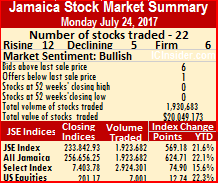 IC bid-offer Indicator| At the end of trading in the main and US dollar markets, the Investor’s Choice bid-offer indicator reading shows 6 stocks with bids higher than their last selling prices and 1 with a lower offer.
IC bid-offer Indicator| At the end of trading in the main and US dollar markets, the Investor’s Choice bid-offer indicator reading shows 6 stocks with bids higher than their last selling prices and 1 with a lower offer.
The main market ended trading with an average of 96,184 units valued at $988,206 for each security traded compared to an average of 84,101 units valued at $1,506,947. The average volume and value for the month to date ended at 117,153 units with an average value of $2,509,606 compared with an average of 118,550 units with an average value of $2,611,033 on the previous trading day. The average volume and value for June ended at 218,951 units with an average value of $3,871,959.
In market activity, Berger Paints traded 68 cents higher to close at $15.68, with an exchange of 3,390 shares, Cable and Wireless closed at 94 cents with 482,520 stock units traded, Caribbean Cement closed at $25.70, after losing 5 cents trading 8,699 shares, Carreras traded $2.25 higher to close at $90.25, with 3,615 units changing hands, Grace Kennedy closed at $41.50, with a loss of 49 cents exchanging 130,586 shares. Jamaica Broilers closed at $18.50, trading 19,716 shares and rising 50 cents, 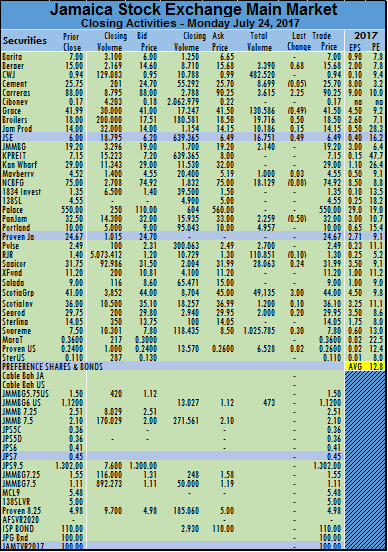 Jamaica Producers gained 15 cents, closing at $14.15 with 10,186 shares traded. Jamaica Stock Exchange closed 49 cents higher at $6.49 while exchanging 16,751 shares, JMMB Group traded 2,140 shares at $19.20. Mayberry Investments gained 3 cents to close at $4.55, with an exchange of 1,000 units, NCB Financial Group retreated 8 cents to $74.92, after exchanging 18,129 shares, PanJam Investment lost 50 cents and closed at $32, with 2,259 units changing owners, Portland JSX traded 4,957 shares at $10, Pulse Investments closed at $2.49, with 2,700 shares trading, Radio Jamaica closed 10 cents lower to $1.30 trading 110,851 shares. Sagicor Group gained 24 cents, with an exchange of 28,063 shares, to close at $31.99. Scotia Group traded $3 higher to $44 with 49,135 shares changing hands, Scotia Investments closed with gains of 10 cents to $36.10 trading 1,200 units, Seprod gained 20 cents, closing at $29.95 while exchanging 2,000 shares, Supreme Ventures closed at $7.80, gaining 30 cents with 1,025,785 shares being exchanged. Proven Investments US ordinary shares gained 0.02 US cents to close at 26 US cents trading 6,528 units and JMMB Group US 6% preference share exchanged 473 units at US$1.12.
Jamaica Producers gained 15 cents, closing at $14.15 with 10,186 shares traded. Jamaica Stock Exchange closed 49 cents higher at $6.49 while exchanging 16,751 shares, JMMB Group traded 2,140 shares at $19.20. Mayberry Investments gained 3 cents to close at $4.55, with an exchange of 1,000 units, NCB Financial Group retreated 8 cents to $74.92, after exchanging 18,129 shares, PanJam Investment lost 50 cents and closed at $32, with 2,259 units changing owners, Portland JSX traded 4,957 shares at $10, Pulse Investments closed at $2.49, with 2,700 shares trading, Radio Jamaica closed 10 cents lower to $1.30 trading 110,851 shares. Sagicor Group gained 24 cents, with an exchange of 28,063 shares, to close at $31.99. Scotia Group traded $3 higher to $44 with 49,135 shares changing hands, Scotia Investments closed with gains of 10 cents to $36.10 trading 1,200 units, Seprod gained 20 cents, closing at $29.95 while exchanging 2,000 shares, Supreme Ventures closed at $7.80, gaining 30 cents with 1,025,785 shares being exchanged. Proven Investments US ordinary shares gained 0.02 US cents to close at 26 US cents trading 6,528 units and JMMB Group US 6% preference share exchanged 473 units at US$1.12.
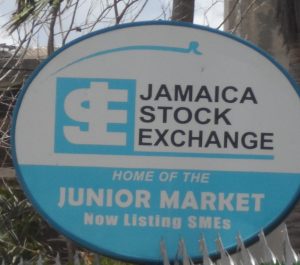 Trading on the Junior Market dropped sharply on Monday to 1,438.180 shares valued at $7,648,204.78, from 8,428,003 shares valued at $32,387,101 on Friday. At the close, the market index rose 32.62 points to 2,988.90.
Trading on the Junior Market dropped sharply on Monday to 1,438.180 shares valued at $7,648,204.78, from 8,428,003 shares valued at $32,387,101 on Friday. At the close, the market index rose 32.62 points to 2,988.90.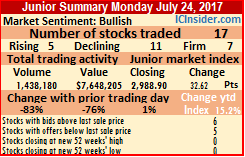 AMG Packaging closed at $3.50 with 7,486 units changing hands, Blue Power dived $4 to close at $45 with 143 units, CAC 2000 lost 31 cents with 500 shares trading to end at $6.40, Caribbean Cream jumped by $1 and closed trading with 3,205 units at $6, Caribbean Producers lost 23 cents to close trading with 700 units, at $3.07, General Accident lost 20 cents and closed trading with 14,242 shares at $2.50, ISP Finance slipped $2 and closed with 23,500 units changing hands at $12, Jetcon Corporation traded 142,419 shares to end at $4.50, after slipping 4 cents, KLE Group ended at $2 with 31,325 shares changing hands,
AMG Packaging closed at $3.50 with 7,486 units changing hands, Blue Power dived $4 to close at $45 with 143 units, CAC 2000 lost 31 cents with 500 shares trading to end at $6.40, Caribbean Cream jumped by $1 and closed trading with 3,205 units at $6, Caribbean Producers lost 23 cents to close trading with 700 units, at $3.07, General Accident lost 20 cents and closed trading with 14,242 shares at $2.50, ISP Finance slipped $2 and closed with 23,500 units changing hands at $12, Jetcon Corporation traded 142,419 shares to end at $4.50, after slipping 4 cents, KLE Group ended at $2 with 31,325 shares changing hands, 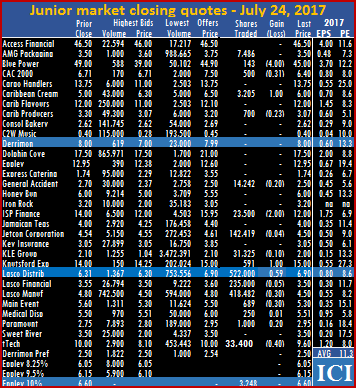 Knutsford Expressclimbed $1 in trading 591 shares to end at $15, Lasco Distributors closed 59 cents higher at $6.90 after trading 552,000 units, Lasco Financial lost 5 cents and ended with 235,000 shares changing hands at $3.50, Lasco Manufacturing shed 30 cents and ended with 418,482 shares trading at $4.50, Main Event lost 30 cents to close with 689 shares trading at $5.30, Medical Disposables rose 1 cent, ending at $5.51 with 250 units trading, Paramount Trading gained 20 cents and ended with 1,000 units changing hands at $2.95 and tTech traded 33,400 units, falling 40 cents to close at $9.60.
Knutsford Expressclimbed $1 in trading 591 shares to end at $15, Lasco Distributors closed 59 cents higher at $6.90 after trading 552,000 units, Lasco Financial lost 5 cents and ended with 235,000 shares changing hands at $3.50, Lasco Manufacturing shed 30 cents and ended with 418,482 shares trading at $4.50, Main Event lost 30 cents to close with 689 shares trading at $5.30, Medical Disposables rose 1 cent, ending at $5.51 with 250 units trading, Paramount Trading gained 20 cents and ended with 1,000 units changing hands at $2.95 and tTech traded 33,400 units, falling 40 cents to close at $9.60.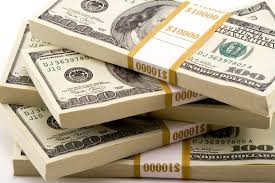 Inflows into the Jamaican foreign exchange market jumped to the highest level in July to US$61.79 million on Monday with outflows of $41.8 million and helped in bringing the month’s surplus of all currencies traded to US$140 million.
Inflows into the Jamaican foreign exchange market jumped to the highest level in July to US$61.79 million on Monday with outflows of $41.8 million and helped in bringing the month’s surplus of all currencies traded to US$140 million. 
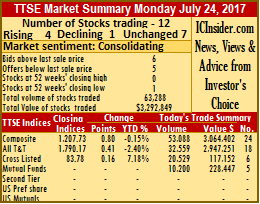 Losses| West Indian Tobacco closed at a 52 weeks’ low of $125.82, losing 1 cent with 20,500 shares valued at $2,579,315 trading.
Losses| West Indian Tobacco closed at a 52 weeks’ low of $125.82, losing 1 cent with 20,500 shares valued at $2,579,315 trading.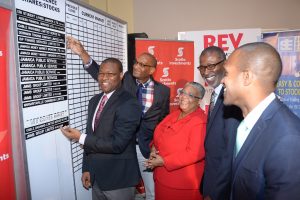
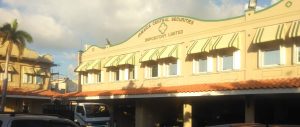

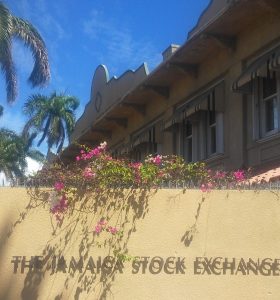 A sharp fall of $92 million in Exchange Operations’ revenue for the half year to June, resulted in the segment results falling $110 million to $41 million but a 41 percent rise in Depository Services’ revenues to $156 million and 20 percent in Trustee Services’ income to $137 million resulted in the segments’ profit rising by 83 percent and 17 percent to $82 million and $75 million respectively.
A sharp fall of $92 million in Exchange Operations’ revenue for the half year to June, resulted in the segment results falling $110 million to $41 million but a 41 percent rise in Depository Services’ revenues to $156 million and 20 percent in Trustee Services’ income to $137 million resulted in the segments’ profit rising by 83 percent and 17 percent to $82 million and $75 million respectively. 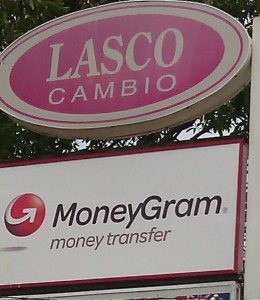

 IPO being nearly 4 times oversubscribed with more than 1,000 applications received for the 52 million shares.
IPO being nearly 4 times oversubscribed with more than 1,000 applications received for the 52 million shares. At the close of the week, IC Insider.com’s TOP 10 Junior Market stocks now trade at an average discount of 45 percent to the Junior Market average, while those in the main market are trading at a 49 percent discount, to the average of the market, leaving stocks with room for growth in the months ahead.
At the close of the week, IC Insider.com’s TOP 10 Junior Market stocks now trade at an average discount of 45 percent to the Junior Market average, while those in the main market are trading at a 49 percent discount, to the average of the market, leaving stocks with room for growth in the months ahead.
 Insider trading in the stock of the company they are connected to can be a big indicators of future prospects, but it is not always the case.
Insider trading in the stock of the company they are connected to can be a big indicators of future prospects, but it is not always the case.


